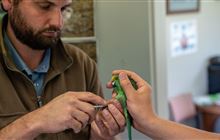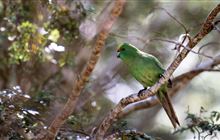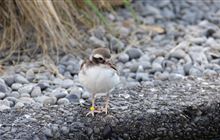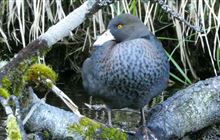The Isaac Conservation and Wildlife Trust
Introduction
The Isaac Conservation and Wildlife Trust works in close partnership with DOC and plays a crucial role in the recovery programmes for five endangered native bird species.Every year, The Trust raises hundreds of birds in their aviary facilities for release into the wild. This significantly reduces the risk of extinction for these endangered native species - a nationally significant contribution to conservation.
Their work has helped to turn the fortunes of these species around and put them on the path of recovery. The Trust manages these endangered species:
- Kākāriki karaka/orange-fronted parakeet Nationally Critical
- Tūturuatu/NZ shore plover Nationally Critical
- Kakī/black stilt Nationally Critical
- Whio/blue duck Nationally Vulnerable
- Pāteke/brown teal At risk - Recovering
Image gallery
-
Trust staff member banding orange-fronted parakeet Image: Michael Hayward | DOC
![Banding orange-fronteed parakeet. Banding orange-fronteed parakeet.]()
-
Pāteke/brown teal chicks at The Isaac Conservation and Wildlife Trust Image: The Isaac Conservation and Wildlife Trust ©
![Pāteke/brown teal chicks at The Isaac Conservation and Wildlife Trust . Pāteke/brown teal chicks at The Isaac Conservation and Wildlife Trust .]()
-
Kakī/black stilt at The Isaac Conservation and Wildlife Trust Image: The Isaac Conservation and Wildlife Trust ©
![Kakī/black stilt at The Isaac Conservation and Wildlife Trust. Kakī/black stilt at The Isaac Conservation and Wildlife Trust.]()
-
Kākāriki karaka/orange-fronted parakeet at The Isaac Conservation and Wildlife Trust Image: The Isaac Conservation and Wildlife Trust ©
![Kākāriki karaka/orange-fronted parakeet at The Isaac Conservation and Wildlife Trust. Kākāriki karaka/orange-fronted parakeet at The Isaac Conservation and Wildlife Trust.]()
-
Tūturuatu/NZ shore plover at The Isaac Conservation and Wildlife Trust Image: The Isaac Conservation and Wildlife Trust ©
![Tūturuatu/NZ shore plover at The Isaac Conservation and Wildlife Trust. Tūturuatu/NZ shore plover at The Isaac Conservation and Wildlife Trust.]()
A conservation legacy lives on
The Trust continues the conservation legacy of Sir Neil and Lady Diana Isaac (the founders of Isaac Construction). Their work is based at their purpose-built 85 ha facility on a restored quarrying site in Christchurch, called Peacock Springs.
They have made significant capital investment in aviaries and provide the expert staff and financial resource to run the captive breeding and rearing facilities.
Staff have decades of captive breeding experience and have pioneered successful new techniques such as whio ‘flock mating’ – when birds breed at random within a selected population. They have also made improvements in methods to incubate and raise kākāriki karaka. Their expertise is invaluable and has made real contributions to what is known about captive breeding for these sometimes-challenging species.
A huge boost for wild populations
Without The Trust’s work, kākāriki karaka would be extinct in the wild. Instead, there are several stable populations - including one at The Brook Waimārama Sanctuary in Nelson. This was established through the release of 120 birds, of which the majority were raised by The Trust.
The Trust is also a critical partner in tūturuatu recovery and has developed the husbandry and breeding techniques for this species. Without a captive programme and its facilities and resources the recovery programme couldn’t establish new populations or recover from disaster.
Peacock Springs plays a vital role in raising chicks of the world’s rarest wading bird, the kakī. Their work significantly boosts captive rearing capacity for kakī alongside DOC’s facility in Twizel. It means people have the chance to see these birds in the wild on the stunning braided rivers of Te Manahuna/the Mackenzie Basin.
Their hardening facility plays a crucial role in preparing whio and pāteke for the rigours of the wild. All captive-bred pāteke and South Island whio are sent to Peacock Springs to learn the skills they will need to survive in the wild once released.










